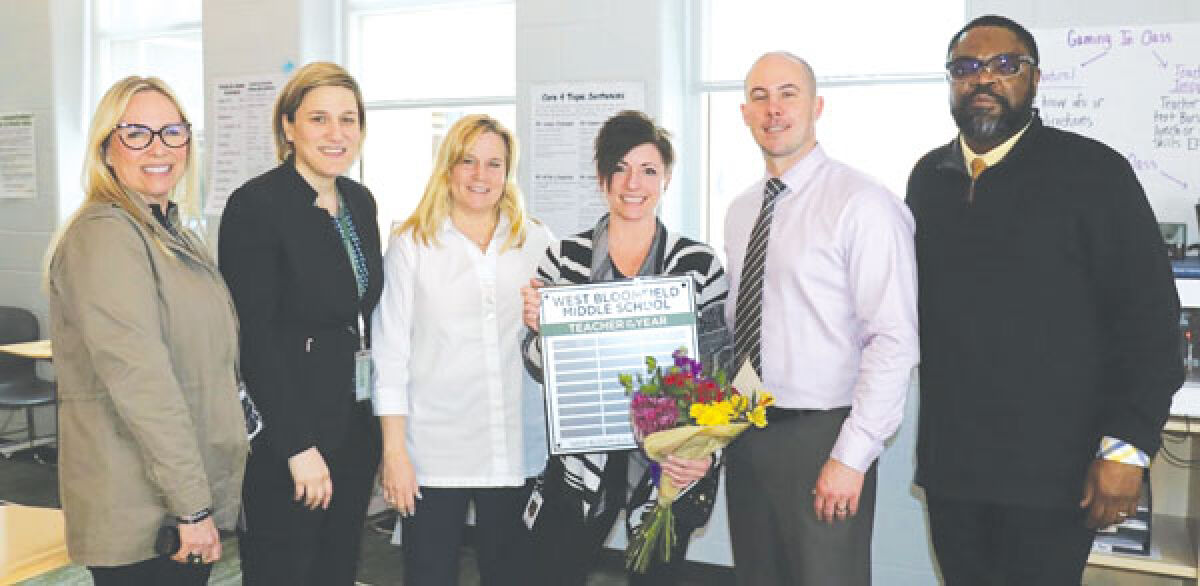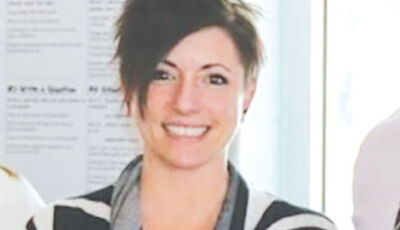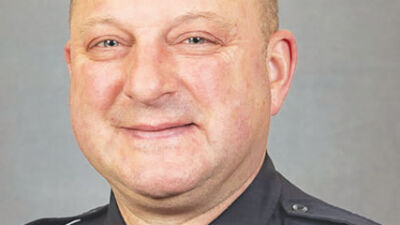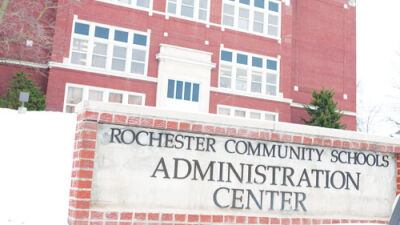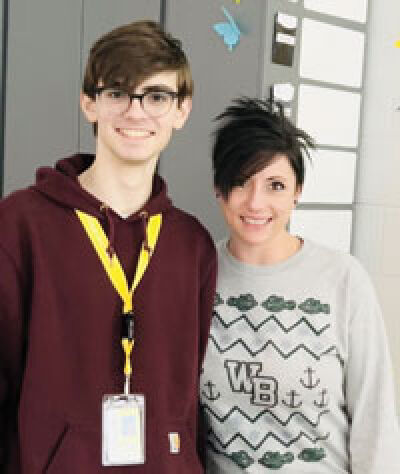
Oakland County Middle School Teacher of the Year Noelle Borst is pictured with one of her former students, Charlie Bannasch, who composed a letter of recommendation on her behalf.
Photo provided by Noelle Borst
WEST BLOOMFIELD — After Noelle Borst began working as a special education teacher in the West Bloomfield School District more than five years ago, West Bloomfield Middle School Principal Amy Hughes said she knew “we had a gem.”
As it turns out, Hughes isn’t the only one who has a lofty opinion of the qualities Borst brings to students in the district, as last month Borst earned the distinction of being named the Oakland County Middle School Teacher of the Year.
Borst works with students in sixth through eighth grades at West Bloomfield Middle School who have issues regulating their emotions. What she teaches is traditionally known as an emotional impairment program.
Last month, she was working with students when Hughes, West Bloomfield School District Superintendent Dania Bazzi, and other personnel from the district made an unannounced appearance in her classroom.
Borst was “shocked” to learn that she had been recognized as the Oakland County Middle School Teacher of the Year.
“No knocking — they just rolled on in,” Borst said. “The attention part I have a very hard time with. I’m a huge advocate for kids with mental health issues, and if having to be super embarrassed myself brings light to people knowing that there are supports out there for these kids, and if it helps school districts start moving towards a more inclusive model than what a lot (of) schools have for EI programs right now, then I’ll embarrass myself all day long.”
Hughes submitted the application to get Borst nominated. Letters of recommendation on her behalf were also submitted to Oakland Schools by one of her former students, Charlie Bannasch; his mom, Denise Bannasch; and Jill Guanco, who is a social worker at West Bloomfield Middle School.
Bannasch is now in high school and worked with Borst at Abbott Middle School, prior to the district opening West Bloomfield Middle School. The day that Borst learned of her recognition, Bannasch went to West Bloomfield Middle School to personally read the letter of recommendation that he had submitted.
“I cried for a good 20 minutes,” she said.
“I think that if it weren’t for Mrs. Borst I wouldn’t be as successful in high school as I am,” Bannasch’s letter of recommendation reads. “Before going to middle school, due to some unusual circumstances, there was a gap in my education. Mrs. Borst helped to facilitate a fitting education through middle school. In seventh grade, I tested into advanced math, and as a junior in high school, I tested into another level up. Starting in the second semester of the ’22-’23 school year, I play the piano accompaniment for the concert choir, which is an opportunity that I did not have in elementary school. I have made so much progress in just those three years of middle school because of her. To this day, Mrs. Borst is the most hard working and understanding teacher I have ever met. I have no doubt that many of her students will have similar success stories to tell because of her.”
Denise Bannasch said that her son was also in an emotional impairment program in elementary school.
She described the difference between that and Borst’s approach as night and day.
“Her approach was completely different than the approach that the elementary school had taken, and it’s important because she uses evidence-based methodologies with her students, and it’s just a totally different approach and outcome for all kids, not just mine,” she said. “So it was huge.”
Denise Bannasch expanded on the primary difference between the two approaches.
“The approach in elementary school was more punitive, which might work for some kids but does not work for all kids, and it did not work for my son,” she said. “It would escalate him. … You need a different lens to look at certain kids, and Mrs. Borst was aware of that. … Mrs. Borst saw each kid as an individual, and so their needs were met accordingly.”
According to Denise Bannasch, Charlie, who is now in 11th grade, made so much progress in middle school that he no longer qualifies to be in an EI program.
After submitting an application for Borst’s nomination, Hughes said that she had no doubt in her mind that she was going to win.
“She’s not just a teacher. She is a counselor, a social worker, a consultant, a family therapist,” Hughes said. “She goes above and beyond with every single one of her students that she has — and not just the students that are on her caseload. … She really does teach kids how to self-regulate their emotions, and we know these kids coming off COVID these past couple years, that is a No. 1 issue in schools across the country. … She really listens to kids and coaches them.”
Borst has been teaching for more than 17 years. After earning a bachelor’s in social work from Western Michigan University, she worked as a social worker for approximately a year.
At some point along the way she came to the conclusion that she could have an even greater impact on people’s lives by taking what social workers offer and applying it to teaching.
“It is the social work aspect that I love; it’s reaching the kids, connecting, getting the family some type of services,” Borst said. “But when I was a social worker I had, like, 50 kids in my caseload. … I’m like, ‘Wow. In order to do this effectively, I have to be a teacher,’ because then you’re seeing them every day, whereas if you’re the social worker you might only see them once a month. … So I went back and got my master’s.”
After making the decision to teach, Borst went on to New York University.
She said that it was the right choice.
“I see all the kids at least an hour a day, and I think that really makes a difference,” Borst said.
Borst believes that there is a negative label attached to students who sometimes struggle to regulate their emotions. However, she is of the opinion that many such students are in fact very intelligent, and she is an advocate of giving them a chance.
“So many people take their behavior and think, ‘Well, he’s manipulative, she’s doing it on purpose, or he just wants attention,’” Borst said. “My favorite part about it is educating people for why. I mean, there’s actual brain-based research reasons why these kids have the difficulties they have, and I love this building, because the teachers are so willing to hear it. I’ve been in buildings in the past where it was like, ‘No, just discipline, reward, punishment,’ and that is not (going to) change kids, in terms of motivation to want to do well.”
Hughes shared her rationale for why Borst’s approach works.
“After months of working with a kid, she knows what makes that kid tick,” she said. “You find out what is behind those behaviors, you deal with that, and then those behaviors stop. She’s the child whisperer.”
Along with stating that Guanco is fantastic, Borst also credited Hughes for making a decision that she thinks makes her students feel accepted.
“I go into the teachers’ classrooms and help them — give them strategies for how to support the kids when they’re in their classes,” Borst said. “It’s a very inclusive environment. If you went to an EI classroom it might be like a little room in a basement with a seclusion room, and when we built this school, Amy’s like, ‘Nope, front and center — no seclusion room, no nothing; everybody sees.’”
Borst has a different take on what is traditionally referred to as an EI classroom.
“I like to call it the therapeutic classroom, because not all the kids — they can’t all fit in a little EI box,” she said. “They’re all so different.”
Borst graduated from Chippewa Valley High School in Clinton Township. She is married with two children.
She credited a “team of people” for her recognition as the Oakland County Middle School Teacher of the Year.
“It’s that building of people who are extremely supportive to all the kids I work with — administration, teachers, paras. … It’s that team of people, not me as one person.”
 Publication select ▼
Publication select ▼